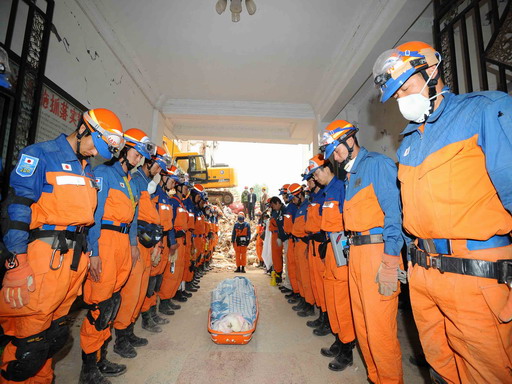The difference lies in the sufficiency of preparation. With adequate preparation, we can, with skill, deflect danger, save countless lives, rapidly recover and rise from the ruins. In a society that is unprepared, natural disasters will be compounded by shortcomings of human fault and error.
Japan’s earthquake not only teaches us what is meant by this era of risk, but it also teaches us that the best preparation for a big risk is a big response.
After the 1995 Kobe earthquake, the chassis of Japan’s big nation and big society status played a significant role. The performance of the government at that time drew some criticism, but its incompetence did not lead to devastating consequences, as it was not the only branch bearing responsibility. The Japanese society at that time was a self-governing society; a self-governing society is a polycentric one, one with a dense web of load-bearing walls. If one or several of these collapses, the impact is minimal, and not enough to cause a national collapse. The rapid intervention of civil forces after the Kobe earthquake minimised the loss of life due to government failure. Even the Yamaguchi underworld group headquartered in Kobe came forward, providing food and daily necessities to some of the victims.
Japan, having learned from the Kobe earthquake, performed excellently in response to the recent earthquake. The government did not fail this time but was orderly, causing a quick about-turn of the popularity of Naoto Kan’s cabinet. This was a classic case of a courageous government refusing to be defeated by criticism, but rather learning and growing from it, and in doing so, recovering its dignity.
However, compared to the strength of the government, it was the strength of the nation and society that was the most touching. Japan’s media, represented by Nippon Hōsō Kyōkai (NHK), neither panicked nor applied sensationalism, but spared no efforts to provide a plain and accurate information service. Some people have lamented that the role of NHK in the disaster relief was greater than that of the government. But what is the point of public media? Why is the public utility of the media important? The Japanese media’s effective response in the earthquake should force us to reflect deeply on these questions.
Japan’s schools and communities, its civil society, without exception played their own role to help with the disaster relief. Neither receiving nor needing executive orders, they seemed to have a natural cohesion, throwing themselves into the relief effort in an instinctively orderly fashion. Free public phones, free shelter materials, free food supply, the orderly and smooth flow of public transport. All of this was mostly unsolicited and occurred in a low-key fashion.
The force of the natural disaster is great, but the strength of the social framework is still greater. This is a solid social chassis, forming a safety net warding off the risk of any major disasters, warming people’s hearts and blessing countless lives. How could a major 9.0 earthquake and a raging tsunami not cause hundreds of thousands, of casualties? Why was the entire social order able to operate effectively despite having been dealt such sudden and deadly blows? This social chassis is the basic reason.
Let our society become better prepared: to become more organised, let our social chassis become more solid and powerful. Everything that is conducive to this approach should be encouraged; everything contrary is to be condemned and curbed. Japan’s big nation and big society was laid down by the restructuring of constitutional government in the middle of last century, and the country has so far seen half a century of great results.
A society that lacks the ability to order itself, that can only rely on executive orders to mobilise and organise, is a society that is as stable as a plate of loose sand.
The strength of the civil society that grew from China’s 2008 Sichuan earthquake is still there; what’s to stop us from building upon it?
Our own foundations are not so weak, as the relief efforts after the Sichuan earthquake proved. This strength of civil society should not be short-lived, and we should take a responsible and constructive attitude towards our state and the nation.
This article was adapted from one originally published in Chinese on ifeng.com. David Kelly provided translation.

